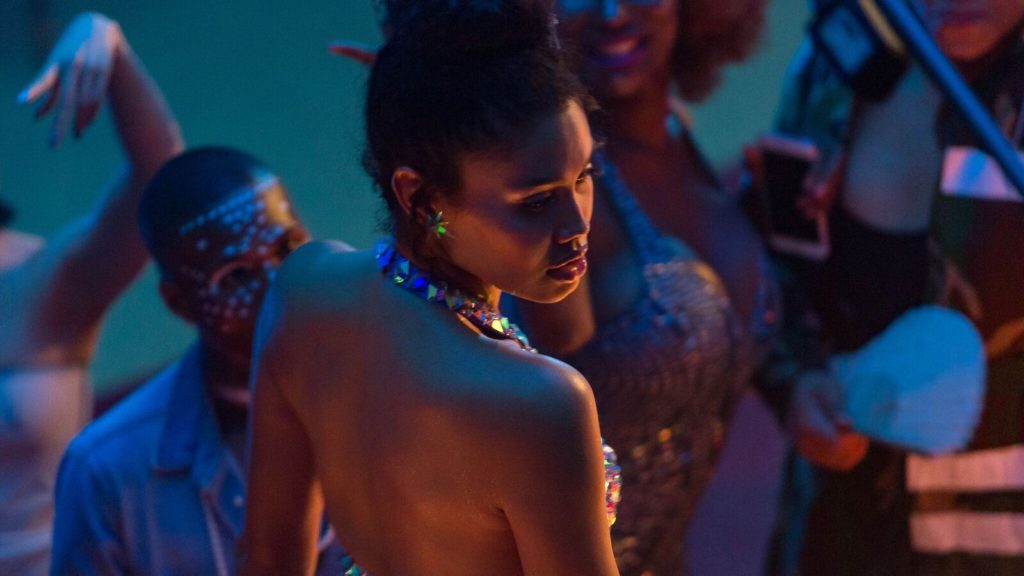Danielle Lessovitz is a New York-based writer and director in film and advertising. Her most recent screenwriting effort, “Mobile Homes,” which she co-wrote with Vladimir de Fontenay, premiered in the Directors’ Fortnight section at Cannes 2017.
“Port Authority” will premiere at the 2019 Cannes Film Festival on May 18.
W&H: Describe the film for us in your own words.
DL: “Port Authority” explores the question of why someone would deny themselves the chance to love and be loved.
W&H: What drew you to this story?
DL: I wanted to write about a connection, both romantic and familial, that transcends biological and social dictates and reflects my experience of the world more closely. I also wanted to comment on dominant American culture, in that it can be toxic even to those who benefit from its bias.
W&H: What do you want people to think about when they are leaving the theater?
DL: I want people to think about their own lives with greater depth, compassion, and possibility.
W&H: What was the biggest challenge in making the film?
DL: The biggest challenge of the film was in making sure everyone who participated in it felt represented on-screen. We did a tremendous amount of research and workshopping on the script and all of the actors participated in shaping it.
Our casting directors, Damian Bao and Kate Antognini, worked continuously for a year to cast this film. They probably attended every kiki ball in NYC during that year looking for talent. Many of the roles were re-written around our actors and the role of Mother McQueen didn’t exist until Afrika came in and gave really strong relationship advice to one of our readers.
We also made sure that the creative team behind the project came from diverse artistic perspectives and that what was on-screen was also reflected in who was behind the camera.
W&H: How did you get your film funded? Share some insights into how you got the film made.
DL: The funding for this project came pretty naturally which I don’t think is very typical. We also didn’t spend much time navigating American financing options, but instead worked with partners abroad.
About a month after writing the first draft we were accepted into the Torino Film Lab, where we won a production grant which helped up take out loans for development and casting. After that, we were awarded grants from the CNC in France and New York State Council of the Arts. From there, RT features joined and put together a financing package with the help of MUBI and Rhea Films.
Development and financing took around two years.
W&H: What inspired you to become a filmmaker?
DL: I think I simply wanted a way to be honest about what I was seeing and experiencing, I wanted a way to make sense of very complex feelings and to communicate those as best I could.
I responded very strongly to poetry when I was growing up, and for me filmmaking is a natural extension of this. It’s also a bit like painting in that I feel I am making portraits of characters as they change over time.
That said, I am very curious and I like to play and filmmaking is really the best way to be curious and playful with a lot of people at once.
W&H: What’s the best and worst advice you’ve received?
DL: The best advice was from my professor at NYU, Ira Sachs, who said that if there’s a problem in your film, fix it in the next one. That is, don’t get stuck on the imperfections of your work — simply keep going and improve with each film.
The worst advice I’ve received is generally along the lines of “it can’t be done.”
W&H: What advice do you have for other female directors?
DL: The advice I have for female directors would be the same for any director, which is to listen to yourself.
W&H: Name your favorite woman-directed film and why.
DL: “Ratcatcher” by Lynne Ramsay is perhaps the most impressive first feature by a female director for me. With this film she invented a subjective visual language which influenced an entire generation of emerging filmmakers.
More recently I was deeply moved with “Happy as Lazzaro” by Alice Rohrwacher for its simplicity, inventiveness, and depth.
W&H: It’s been over a year since the reckoning in Hollywood and the global film industry began. What differences have you noticed since the #MeToo and #TimesUp movements launched?
DL: It seems like there’s greater openness for female perspectives and more acknowledgement of the default gender bias and the subsequent power imbalance.







